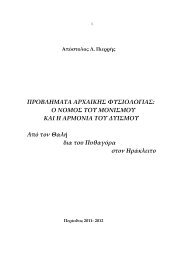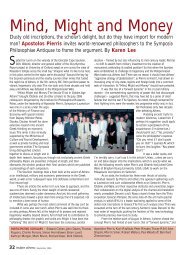APPENDIX C΄ ON DEPILATION: BODY COSMETICS IN CLASSICAL ...
APPENDIX C΄ ON DEPILATION: BODY COSMETICS IN CLASSICAL ...
APPENDIX C΄ ON DEPILATION: BODY COSMETICS IN CLASSICAL ...
You also want an ePaper? Increase the reach of your titles
YUMPU automatically turns print PDFs into web optimized ePapers that Google loves.
<strong>ON</strong> DEPILATI<strong>ON</strong>: <strong>BODY</strong> <strong>COSMETICS</strong> <strong>IN</strong> <strong>CLASSICAL</strong> ANTIQUITY 595<br />
woman invites the rest to punish Mnesilochus who, disguised as a<br />
woman inveighed against them supporting Euripides, misogynic<br />
sentiments):<br />
Ôû ÙÔÈ Ìa ÙcÓ òAÁÏ·˘ÚÔÓ, t Á˘Ó·ÖΘ, Âs ÊÚÔÓÂÖÙÂ,<br />
àÏÏ’ j appleÂÊ¿ÚÌ·¯ı’ j ηÎfiÓ ÙÈ Ì¤Á· appleÂapplefiÓı·Ù’ ôÏÏÔ,<br />
Ù·‡ÙËÓ âáÛ·È ÙcÓ ÊıfiÚÔÓ ÙÔÈ·ÜÙ· appleÂÚȸ‚Ú›˙ÂÈÓ<br />
ìÌĘ êapple¿Û·˜. Eå ÌbÓ ÔsÓ ÙȘ öÛÙÈÓ Âå ‰b Ì‹, ìÌÂÖ˜<br />
·éÙ·› Ù ηd Ùa ‰Ô˘Ï¿ÚÈ· Ù¤ÊÚ·Ó appleÔıbÓ Ï·‚ÔÜÛ·È<br />
Ù·‡Ù˘ àappleÔ„ÈÏÒÛÔÌÂÓ ÙeÓ ¯ÔÖÚÔÓ, ¥Ó· ‰È‰·¯ıFÉ etc.<br />
In Âå ÌbÓ ÔsÓ ÙȘ öÛÙÈÓ (the vulgate text; the codex Ravennas has<br />
Ù›˜ âÛÙ›Ó, but they did not share in the 10th century our modern<br />
conventions) there is a problem of interpretation bearing on our<br />
present discussion. In the Schol. Ven. ad Iliadem A137 we meet the<br />
reversal öÛÙÈ ÙȘ hence öÛÙÈÓ ÙȘ Hermann, öÛÙÈ Ù›ÛȘ Bergk (! What<br />
is to be expected from Bergk: daring ingeniosity rather than truth),<br />
ñÌáÓ ÙȘ Herwerden concerning whose construal see immediately<br />
below. Von Velsen, building upon Bergk s conjecture, reshaped the<br />
verse as follows: Âå ÌbÓ ÔsÓ Ù›ÛȘ Ù›˜ âÛÙ’ âÓ ìÌÖÓ etc. It is difficult to<br />
see how this could be corrupted to the mss. texts. And it gives a weak<br />
and inappropriate meaning. It is unnatural and very unAristophanic.<br />
The vulgate interpretation is “if there is somebody among you<br />
(presumably addressing the chorus who commented immediately<br />
before) who would punish this pest here (let her do it; an aposiopesis);<br />
otherwise we and our slave-girls will etc.”, the àappleÔÙÈÏÌe˜ ÛfÓ Ù¤ÊÚ÷·<br />
being mentioned as the intended punishment. But this is<br />
unsatisfactory, there being no adequate reason for the implied<br />
preference that somebody else should do the punishment; in fact the<br />
speaking lady, in an Aristophanic context, would rather enjoy<br />
executing the judgment she herself pronounces on the culprit. In any<br />
case the point would have been weak, or even lost, for such a forceful<br />
àappleÔÛÈÒappleËÛȘ or àÓ·ÓÙ·applefi‰ÔÙÔÓ. (To the vulgate interpretation<br />
Herwerden also adheres, who smoothes out as it were the construction<br />
grammatically, by changing the ÙȘ öÛÙÈÓ to ñÌáÓ ÙȘ as noticed<br />
above, and understands as implied àappleÔ„ÈÏÒÛÂÈ, ηÏᘠö¯ÂÈ (= well<br />
and good)). Fritzsche attempts to supply the missing point by taking<br />
the appeal to be to some man (“since it would be improper for us










